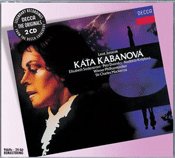Charles Mackerras continues to reign as the supreme conductor of Jan·?ek’s music, and these sets provide further evidence of that, not least by filling up the second discs with other pieces. The *Jen?fa* set includes the final scene in the revised orchestration that introduced the opera to most of the world, before Mackerras led the return to Jan·?ek’s original score, and the set concludes with an overture considered for the opera but never used. Jan·?ek ‘s *Concertino* and *Capriccio* close the *K·tya Kabanov·* set, both in witty performances conducted by David Atherton. The mood of those pieces is quite a bit different from that of the opera, it should be said.
Both sets feature informative essays by John Tyrrell, which give not only detailed background on Jan·?ek’s compositions, including almost academic musical analysis, but also ample information on the original works behind the operas. In the *Kabanov·* booklet Tyrrell’s essay is followed by a note from Mackerras, relating his first exposure to the composer who would become such a large part of his career.
[ ](http://www.amazon.com/dp/B000E6EGYG?tag=operatoday-20&camp=14573&creative=327641&linkCode=as1&creativeASIN=B000E6EGYG&adid=1VB8ZEK4VSP6G12RGSM6&)The *Kabanov·* set came in 1978, and its sound world is quite different from that of *Jen?fa*, composed many years before. The later work comes from the composer’s mature period, and it combines the exciting rhythms and naturalistic declamation found in the earlier work with a richer orchestral fabric, somewhat resembling the textures of his *Taras Bulba*. However, it seems to be the earlier opera that has established itself as the more performed of the two, undoubtedly due to the power of its story and characters. Both stories deal mainly in pain and distress, but *Jen?fa* ends with a gorgeous duet of redemptive love, whereas *Kabanov·*’s heroine throws herself into a river, unable to find a way to live a new life or return to her old one. Nonetheless, as pure listening experience, your reviewer finds *K·tya Kabanov·* a more entrancing score to listen to, with its greater variety of tone and mood. *Jen?fa*, on the other hand, works best on stage, where its characters come to full life, and can break the hearts of most any audience.
](http://www.amazon.com/dp/B000E6EGYG?tag=operatoday-20&camp=14573&creative=327641&linkCode=as1&creativeASIN=B000E6EGYG&adid=1VB8ZEK4VSP6G12RGSM6&)The *Kabanov·* set came in 1978, and its sound world is quite different from that of *Jen?fa*, composed many years before. The later work comes from the composer’s mature period, and it combines the exciting rhythms and naturalistic declamation found in the earlier work with a richer orchestral fabric, somewhat resembling the textures of his *Taras Bulba*. However, it seems to be the earlier opera that has established itself as the more performed of the two, undoubtedly due to the power of its story and characters. Both stories deal mainly in pain and distress, but *Jen?fa* ends with a gorgeous duet of redemptive love, whereas *Kabanov·*’s heroine throws herself into a river, unable to find a way to live a new life or return to her old one. Nonetheless, as pure listening experience, your reviewer finds *K·tya Kabanov·* a more entrancing score to listen to, with its greater variety of tone and mood. *Jen?fa*, on the other hand, works best on stage, where its characters come to full life, and can break the hearts of most any audience.
Elisabeth Soderstrom stars on both sets, her warm, womanly sound appropriate for both characters, and her command of the idiom as sound as her conductor’s. Peter Dvorsky gets to portray both the handsome but weak Steva of *Jen?fa* and the handsome but weak Boris in the *Kabanov·*. He does so handsomely, with no weakness. Wieslaw Ochman earns his redemption as Laca with urgent, masculine passion. The Kostelni?ka, Eva Randova, has a full, secure voice, whereas on stage the role is often taken by a veteran singer whose voice may be worn but who can embody the character convincingly. The counterpart role in *Kabanov·*, K·tya’s mother-in-law, is sung with fierce relish by Nad?zda Kniplov·.
For any opera lover who somehow never managed to acquire these sets in the long years when they were only available at full-price, now is the time to search them out and add them to your collection. Indispensable.
Chris Mullins
image=http://www.operatoday.com/Jenufa_4758227.gif
image_description=Leos Jan·?ek: Jen?fa
product=yes
product_title=Leos Jan·?ek: Jen?fa
product_by=Elisabeth Sˆderstrˆm, Eva Randov·, Wieslaw Ochman, Peter Dvorsky, Wiener Staatsopernchor, Wiener Philharmoniker, Charles Mackerras
product_id=Decca 475 8227 [2CDs]
price=$22.99
product_url=http://www.arkivmusic.com/classical/album.jsp?album_id=168715
Jan·?ek: K·tya Kabanov·
Decca 475 7518